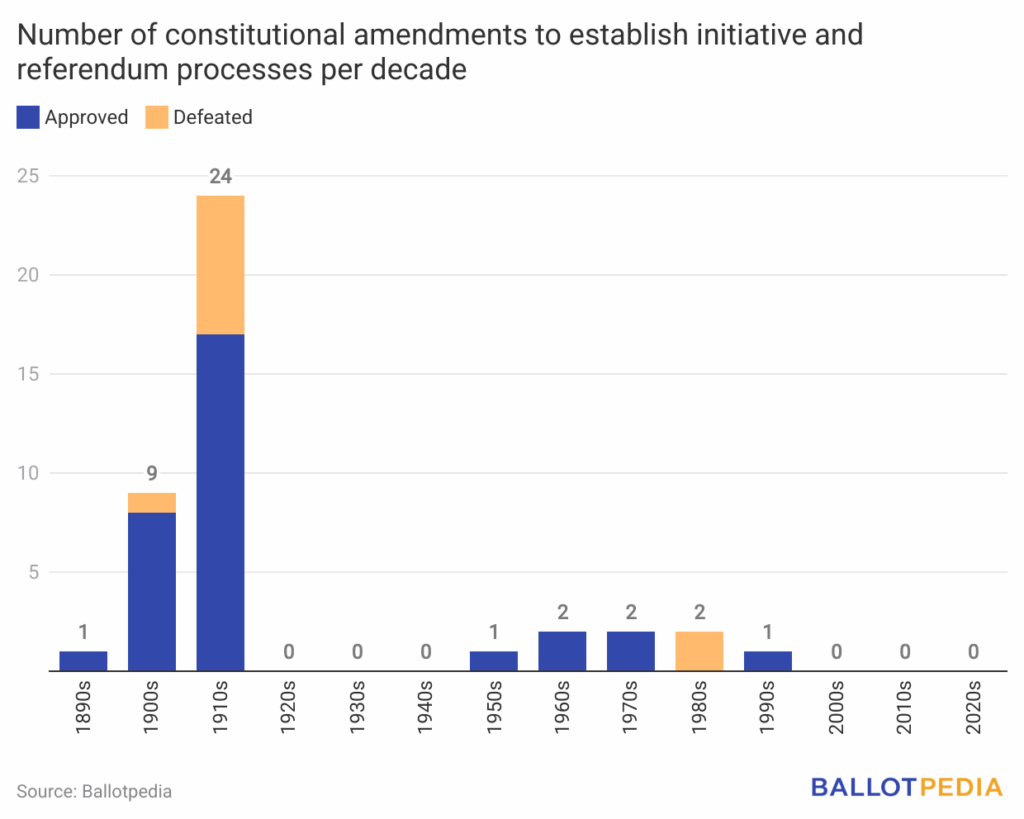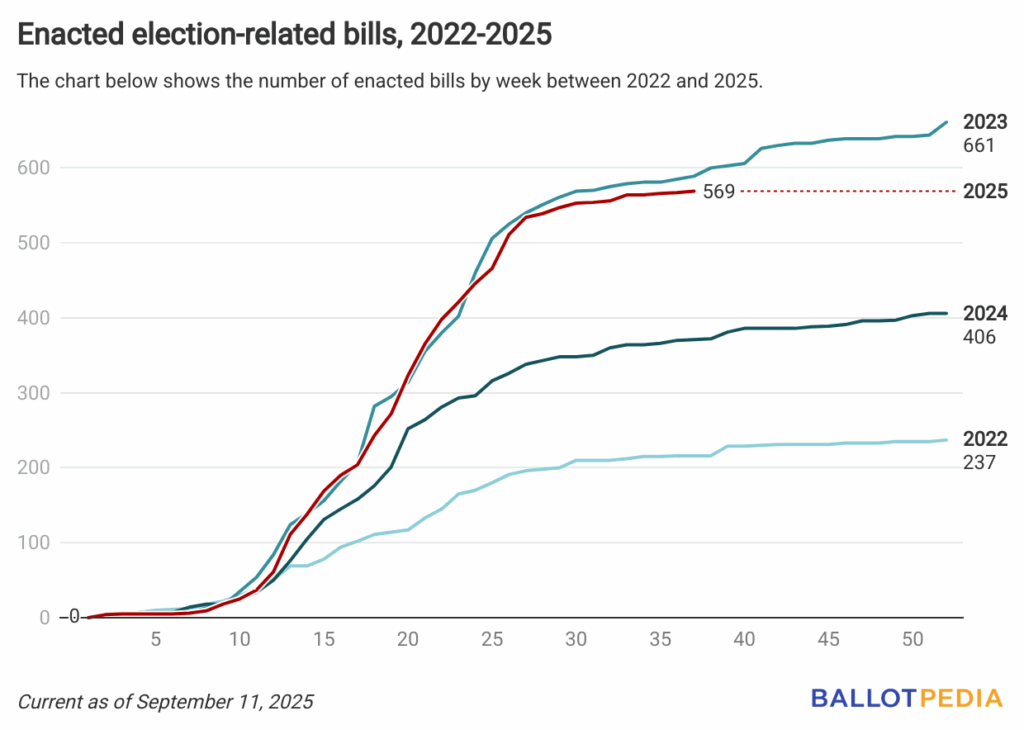Daily Brew: September 15, 2025
Welcome to the Monday, Sept. 15, Brew.
By: Briana Ryan
Here’s what’s in store for you as you start your day:
- Senate Republicans invoke nuclear option to change nomination rules
- 117 years ago today, Maine became the seventh state to approve an initiative and referendum process
- A roundup of recent election administration legislative activity
Senate Republicans invoke nuclear option to change nomination rules
On Sept. 11, Senate Republicans voted to change chamber rules governing the nomination process for certain presidential nominees. The vote was 53-45, along party lines. This procedure, where a majority party changes a Senate rule or precedent through a simple majority vote, is often referred to as the nuclear option or constitutional option.
This change in Senate precedent now allows the chamber to vote by simple majority to confirm a slate of nominees in a group, rather than having to conduct individual confirmation votes for each nominee. The Senate can use this new precedent to confirm ambassador nominees and nominees to work in executive departments and agencies. Cabinet-level and judicial nominations are excluded and must be confirmed individually.
This rule change affects approximately 1,200 positions in the federal government. Approximately 481 of these positions, or 40%, are currently filled, either by an officeholder held over from the previous administration or by someone confirmed during President Donald Trump's (R) second term.
The Washington Post tracks a subset of these positions consisting of 822 offices. According to their tally, the Senate has confirmed 125 individuals so far during the second Trump administration. This is roughly equal to the number confirmed at this point during Joe Biden's (D) administration, and slightly higher than the number appointed at this point in Trump's first term. At this point during the first terms of George W. Bush's (R) and Barack Obama's (D) presidencies, the Senate had confirmed nearly 300 nominees.
Typically, after a president transmits a nomination to the Senate, a committee will then hold a hearing for that nominee. The committee then votes on whether to advance the nominee. If the nominee is advanced, then the full Senate debates the nomination, votes to invoke cloture on it, and then votes by simple majority to confirm the nominee. Under the new Senate precedent, senators will be able to group together nominees to move through the final votes in the confirmation process without needing the 60-vote majority previously required for bloc nominations.
There have been three other uses of the nuclear option in recent years, all of which affected how the confirmation process works in the Senate. In 2013, Senate Democrats used it to change the threshold to invoke cloture on non-Supreme Court judicial nominations from 60 votes to 50 votes.
The two other recent uses of the nuclear option occurred during Trump's first administration. In 2017, Senate Republicans expanded the rule change from 2013 to include Supreme Court nominations. In 2019, Senate Republicans used the process to reduce the length of post-cloture debate on nominations from 30 hours to 2 hours.
Click here to read more about previous uses of the nuclear option in the U.S. Senate.
117 years ago today, Maine became the seventh state to approve an initiative and referendum process
On this date in 1908, Maine voters approved a constitutional amendment establishing the state's citizen initiative and veto referendum process. The vote was 69% to 31%. Maine was the seventh state to adopt an initiative and referendum process, and the first state east of the Mississippi River to do so.
According to the Initiative & Referendum Institute, Roland T. Patten, editor of the Skowhegan Somerset Reporter and founder of the Initiative and Referendum League of Maine, played a central role in promoting the state's initiative and referendum process. The state's four largest political parties—Republican, Democratic, Socialist, and Prohibition—endorsed the initiative and referendum process.
State Rep. Charles F. Johnson (D), who supported the proposal, said, "I believe the people of Maine can be trusted. I believe that Lincoln was right when he said that the great heart of the people beats true and that it can be trusted upon measures of public importance."
The University of Maine's Rod Farmer said "the newspapers, with the exception of the Waterville Morning Sentinel, were generally hostile" to the initiative and referendum proposal. In 1908, the Bangor Daily News stated, "This measure is a direct blow to a representative form of government, and has a tendency to lessen the responsibility of representatives of the people, and places in the hands of agitators and cranks a weapon which, from the experience of the few States which have adopted it, has not only caused much needless agitation, but a great financial burden on the taxpayers."
Twenty-six states have adopted amendments creating citizen initiatives. Most of these amendments originated from the 1890s to 1920s during the progressive and populist movements. Beginning in 1898, voters in 30 states have decided on 42 amendments to create initiative and referendum processes. South Dakota was the first state to adopt an initiative and referendum process in 1898. The most recent state to adopt an initiative and referendum process was Mississippi in 1992.

Our coverage of the Maine Initiative and Referendum Amendment is part of our Historic Ballot Measures project (HBM), which will document nearly 200 years of direct democracy in the U.S. This ongoing research effort will provide an unparalleled resource for researchers, reporters, and the voting public on how ballot measures have evolved, the issues they've covered, and the role they have played in our civic life.
Click here for more information on the Maine Initiative and Referendum Amendment.
A roundup of recent election administration legislative activity
As legislative sessions continue across the country, we're following the latest nationwide trends and legislative activity related to election policy.
Let's start with some key takeaways from last week's legislative actions:
- Lawmakers in eight states acted on 66 bills over the last week. During the same week in 2024, legislators acted on four bills and 50 in 2023.
- One bill was enacted last week. One bill was enacted during the same week in 2024, four were enacted in 2023, and none were enacted in 2022.
- We are currently following 4,803 bills. At this time in 2023, the last odd year when all states held legislative sessions, we were following 2,898 bills.

Now, let's check out some other noteworthy election-related developments:
- On Sept. 10, a Michigan Senate committee advanced four election policy bills, barring the compensation of petition circulators by signature and making it a crime to provide false information about elections. The bills —SB0529, SB0530, SB0531, and SB0533 — will now go to the Senate floor for a full vote. Democrats hold a 19-18 majority in the Michigan Senate, while Republicans hold a 58-52 majority in the state House.
- On Sept. 8, U.S. District Judge J.P. Boulee rejected a challenge to a Georgia law that prohibits voter registration organizations from sending absentee ballot applications with voters' information already provided and sending applications to voters who already requested one. The groups Voter Participation Center, Center for Voter Information, and VoteAmerica filed the lawsuit in 2021, arguing that the law violated the groups’ free speech rights and impeded voter participation.
- On Sept. 8, the North Carolina Board of Elections released revised rules concerning voters whose names or birth dates do not match information in the state's voter registration files. Under the revised requirements, these voters will no longer have to cast a provisional ballot and can use a regular ballot if they show an accepted form of identification.
- On Sept. 8, the Texas Republican Party sued Secretary of State Jane Nelson (R), arguing that the state's open primary system violates the Party's First Amendment right to association because it requires the Party "to allow voters who may fundamentally oppose the Party’s principles and candidates to choose the Party’s nominees." Under the state's current primary system, any registered voter can participate in either party's primary election. Texas is one of 14 states where state law requires open primaries for congressional or state-level offices.
No bills were vetoed in the past week. 70 bills have been vetoed so far this year. No bills were vetoed during this period in 2024, 2023, or 2022.
A version of this story appeared in our Sept. 12 Ballot Bulletin—our weekly email that follows developments in election policy around the country. Click here to sign up.
You can also click here to see a full list of the bills we're following in 2025.



